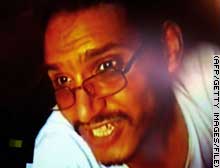Tribes claim leader of al Qaeda in Iraq killed
 BAGHDAD, Iraq (CNN) -- Unconfirmed reports that al Qaeda in Iraq leader Abu Ayyub al-Masri has been killed come from local tribes and not Iraq's intelligence services or military, an Iraqi government spokesman said Tuesday.
BAGHDAD, Iraq (CNN) -- Unconfirmed reports that al Qaeda in Iraq leader Abu Ayyub al-Masri has been killed come from local tribes and not Iraq's intelligence services or military, an Iraqi government spokesman said Tuesday.Ali al-Dabbagh, spokesman for Prime Minister Nuri al-Maliki, said the government won't be able to confirm al-Masri's death until it makes an identification of the body.
"Iraqi security forces do not have the body," al-Dabbagh said on Iraqi state TV. "Iraqi security forces and Multi-National Forces are trying to retrieve the body for visual identification and DNA tests." (Watch how mostly Sunni tribes reportedly were fighting against al Qaeda in Iraq )
Al-Masri -- also known as Sheikh Abu Hamza al-Muhajer -- succeeded Abu Musab al-Zarqawi as the leader of al Qaeda in Iraq after his death in a U.S. airstrike in June.
However, a statement from an Islamist umbrella insurgent group with which al-Masri is affiliated denied that he had been killed.
"The Islamic State of Iraq would like to assure the nation that the sheikh, Abu Hamza Al-Muhajer, is safe, may God protect him, and he is still battling the enemies of God," said a Web posting, which can't be authenticated by CNN.
The reports emerged following a confrontation Tuesday between Sunni tribes and al Qaeda in Iraq at a bridge in an area under Sunni tribal control, al-Dabbagh said. (Read more about a possible rift between Sunni militants and al Qaeda in Iraq)
If Sunni militants had information that led to al-Masri's death, it may be a sign of a rift among Sunni militants in Iraq, said CNN terrorism analyst Peter Bergen.
Militant groups in the nation "have been trying to put a more Iraqi face" on their movement and have been trying to "exclude the foreign militants from a public role," Bergen said.
Al-Masri is Egyptian.
There has been talk among indigenous Iraqi insurgents that such attacks -- which claim civilian lives -- are counterproductive.
Bergen also said that he would not expect al-Masri's death to have any impact on the insurgent movement -- noting that bloody attacks claimed by groups linked to al Qaeda in Iraq had continued despite the killing of al-Zarqawi last year.
Hints of a rift
Hints of rifts among Iraqi militant groups emerged last month when two claims of responsibility for the April 12 Iraqi parliament cafeteria attack had been posted by the Islamic State of Iraq.
Earlier Tuesday, an Iraqi Interior Ministry spokesman said "very strong intelligence" indicated al-Masri was killed in fighting between rival militant groups north of Baghdad.
"We received intelligence reports of al-Masri getting killed in clashes between al Qaeda in Iraq and other militant groups at dawn today" in al-Niba'ie in Taji, north of Baghdad, Brig. Gen. Abdul Karim Khalaf said.
A Pentagon statement said U.S. forces haven't been able to confirm the reports and that they are working with Iraqi officials to determine whether they're true.
John Roberts, acting spokesman at the U.S. Embassy in Baghdad, said he had no information but added he "would not be disappointed" if the reports of al-Masri's death were true.
In February, Iraq's Interior Ministry claimed Iraqi security forces wounded al-Masri in another clash north of Baghdad, but the U.S. military cast doubt on that report. The ministry never backed away from its claim.
Recently, the insurgent umbrella group Islamic State of Iraq posted a list of Cabinet members and named al-Masri as its "war minister."
The group, which includes al Qaeda in Iraq and other insurgents, claimed responsibility for a number of violent acts last month, including the suicide attack at the Iraqi parliament, the killings of nine U.S. soldiers in Diyala province and the execution of 20 security force officers.
On Saturday, the group distributed leaflets in Samarra to police, warning that they have three days to "repent" or be killed.
The insurgent group also told police to use loudspeakers at mosques and marketplaces to announce their rejection of the "apostate state" and their joining of the "Islamic State."
Other developments
President Bush is expected to veto the war spending measure from Congress on Tuesday, reiterating his vow to reject any spending bill with a timetable for removing U.S. troops from Iraq. (Full story)
The Iraqi Interior Ministry said Tuesday that 1,501 Iraqi civilians lost their lives in sectarian and insurgent violence during April, a decline from the previous month when 1,872 civilians were killed. Iraq's death figures have regularly been lower than tallies published by the U.N. Assistance Mission in Iraq.
At least 14 people were killed in a pair of attacks on minibuses south of Baghdad, a police official in Babil province said Tuesday. Police patrols found 11 people shot to death and three others critically wounded near Iskandiriya on Monday night. According to police, the survivors said they played dead to keep from being shot again. The bus was traveling from Hilla to Baghdad. Also Tuesday, gunmen killed three people and wounded five others when they opened fire on a minibus in Lattifiya.
A British soldier riding a bicycle was killed in a traffic accident Tuesday in southern Iraq, the Defense Ministry said. The number of British military personnel killed in the Iraq war stands at 147. Twelve U.K. troops died in April, making it the deadliest month for the British military since the war began in March 2003. At that time, 27 British troops were killed.
CNN's Saad Abedine, Jomana Karadsheh and Michael Ware contributed to this report.
This information is copied from www.cnn.com


0 Comments:
Post a Comment
Subscribe to Post Comments [Atom]
<< Home